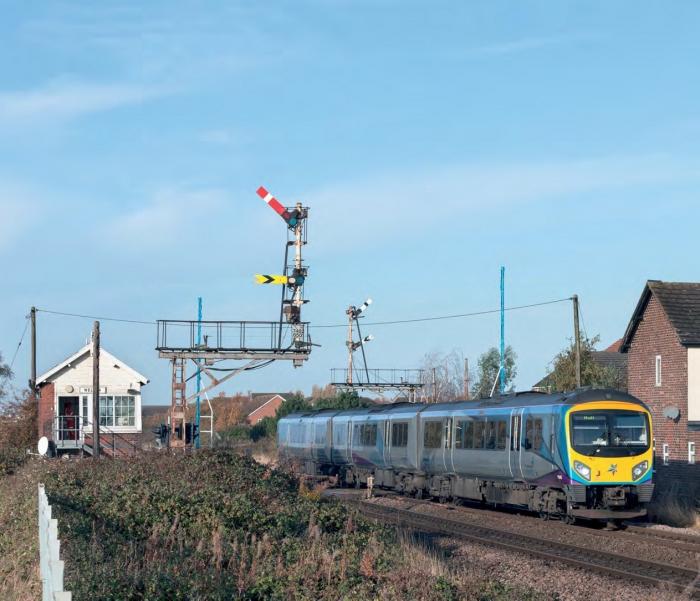Informed Sources
Failure to commission resignalling schemes on schedule has wide-ranging consequences: here’s a case history
As Table 2 shows, while waiting for ETCS, ‘conventional’ resignalling projects continue to be delivered. And late delivery is another cause for concern. In particular there has been a worrying trend for schemes to gang aft agley. Take the replacement of mechanical boxes and manned level crossings on the nine-mile Gilberdyke – Ferriby section between Selby and Hull.
This would appear to have been a straightforward Mod-Sig rollout, although when it was being developed provision was required for the putative private sector electrification of the Selby – Hull route increasing the telecommunications content. When resignalled, control would be transferred to the new York Rail Operating Centre (ROC).
Under Network Rail’s signalling framework contracts structure, Ferriby – Gilberdyke was in Signalling Solutions Ltd (Alstom Balfour Beatty) territory. However, it seems the bid was too high. The alternative framework supplier was Siemens: similarly deemed too expensive. As a result, in February 2016 the £35 million contract was awarded to Ansaldo STS and Linbrooke Services Ltd. Oddly the press release referred to ‘upgrading the seven main stations served along the 35 miles between Ferriby and Gilberdyke’.
Ansaldo would lead the consortium with responsibility for the SEI Computer Based Interlocking (CBI) plus the axle counter system design, supply and integration. This was not the same CBI used at the company’s Manchester South resignalling contract. Linbrooke would deliver the signalling and power construction works, the telecommunications system design and construction, and be the overall Tester in Charge.
When the contract was announced, commissioning was scheduled for March 2018. However, by September 2017 informed sources were reporting that the contractual commissioning date of April 2018 was unlikely to be met. This was causing concern because the closure of the manual boxes would trigger a cascade of staff, which would ultimately release signallers who had volunteered to take early retirement.
FINAL
In January 2018 a Weekly Operating Notice (WON) for drivers advised that the transfer of control to York ROC would be effective from 3 April. In reality, testing over the weekend of 20-21 January was due to inform a ‘Final Review’ of the viability of commissioning on 2 April. Not for the first time, a WON would be premature.
Testing was deferred to the following weekend and the go/no-go decision rescheduled for 31 January. The Final Review meeting eventually took place on 2 February but was inconclusive. A new final Final Review was planned for 15 February.
According to Network Rail, the proposed 2 April commissioning date faced several risks, ‘principally around data development, testing, approvals and product acceptance’. Nothing major then! But, come 15 February, once again, the Final Review was inconclusive. The project was still doggedly working towards commissioning at Easter 2018, but there were still a number of issues around data testing.
At last, another Final Review meeting on 27 February 2018 confirmed that the April commissioning would not go ahead due to issues relating to end-to-end communications between locations in the resignalling area and York ROC. This delay was attributed to the use of ‘new and novel equipment’ in the UK industry for the first time, which meant that there was still ‘a significant amount’ of testing which needed to be completed.

RESOURCES
In today’s railway, a decision to defer a signal commissioning is not taken lightly, hence all those Final Review meetings. The necessary possessions for the commissioning will have been booked a year in advance and attract the payment of compensation for operators under Schedule 4.
There is a limited pool of signalling testers, particularly Testers in Charge (TIC). If one falls sick, as on a recent contract, the commissioning can’t go ahead. Yet, with just four weeks to go, the commissioning was pulled, reducing the possibility of redeploying the testing team allocated to Ferriby – Gilberdyke. However, the 77 hours of disruptive access over the Easter weekend would be used to continue the testing. A further 29 hours of access in May 2018 would be available for additional testing. As Network Rail noted at the time, ‘the project is now focused on getting a stable testing plan in place, following which we will have a better understanding of what needs to be negotiated with train operating companies for a revised commissioning period’.
TESTING
In March there was another Review. This revealed that to complete the works, in addition to the possessions already mentioned, a further two 52-hour weekend possessions would have to be agreed with the train operators. Don’t forget that the train operating companies (TOCs) and freight operators (FOCs) had been planning their future operations on the basis of having an unrestricted railway with super-whizzo new signalling from April 2018. Now, the expectation was that testing would not be completed until 7 August 2018. This would be followed by up to eight weeks of ‘soak testing’.
During my spell in the Test Department as an apprentice, I spent nervous night shifts in sole charge of a £10,000 steel billet undergoing ‘heat soak’ testing before being machined into a steam turbine shaft. English Electric wanted to be sure that the billet did not distort when heated up before even more money was spent on machining it. Today, while there is still thermal performance, soak testing has become shorthand for the verification of a computer software’s stability and performance characteristics over an extended period of time.
POSSESSION
A new commissioning possession date would have to be decided and negotiated with the train operators. August bank holiday 2018 would be cutting it fine on testing and, anyway, the TOCs were gearing up to support a festival in Leeds that weekend.
October 2018 was another possibility. Once again two additional weekend possessions would have to be negotiated with the TOCs. On top of which, the Bradford area resignalling had already booked the preferred access around school half-term. What about Christmas 2018? Well, it would be easier to negotiate access with the train operators at this time. However, York Integrated Electronic Control Centre (IECC) was scheduled to be recontrolled into York ROC over Christmas; adding Ferriby – Gilberdyke would be a recontrol too far. And, of course, the demand on testing staff would be at its highest. It was eventually decided that the preferred option was to commission over two weekends between 23 November and 17 December 2018. The first weekend would cover the main commissioning, followed by commissioning of the MCB-OD level crossings. Three weeks before that there would be a rehearsal.
NEGOTIATION
This proposal now had to be put to the TOCs. Hull Trains, which had threatened to take NR to dispute, agreed the proposed two 52-hour weekend possessions at the end of November. Northern and TransPennine Express, which had seemed positive during informal discussions, objected. However, by the end of July, everyone was on board. Commissioning went as scheduled and the resignalling came into service on Monday 26 November.
As you might expect, given the forgoing saga, it was not a clean handover, with what was termed an engineering over-run. According to informed sources, the certification of conformity document, stating that infrastructure had been tested and commissioned to the group standard that conforms to the RSSB standard, went missing. Quite rightly, Network Rail refused to accept the scheme without the correct paperwork. Fortunately, the missing documentation was found and the handover took place at 08.30.
A number of glitches were reported in the early days, including red aspects not illuminated (black signals) and reversions. The latest report is that the scheme seems to have settled down, although occasional power supply issues are affecting signals.



